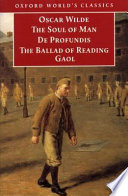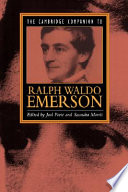 Go love thy infant; love thy woodchopper; be good-natured and modest; have that grace; and never varnish your hard, uncharitable ambition with this incredible tenderness for black folk a thousand miles off. Thy love afar is spite at home. Go love thy infant; love thy woodchopper; be good-natured and modest; have that grace; and never varnish your hard, uncharitable ambition with this incredible tenderness for black folk a thousand miles off. Thy love afar is spite at home.  Select Essays and Poems - Página 33por Ralph Waldo Emerson - 1898 - 120 páginasVisualização integral Select Essays and Poems - Página 33por Ralph Waldo Emerson - 1898 - 120 páginasVisualização integral - Acerca deste livro
 | Jim Sanderson - 1998 - 148 páginas
...genius"; "Whoso would be a man must be a nonconformist"; "Your goodness must have some edge to it—else it is none. The doctrine of hatred must be preached...the counteraction of the doctrine of love when that pulses and whines. I shun father and mother and wife and brother, when my genius calls me. I would... | |
 | Tyler T. Roberts - 1998 - 245 páginas
...the future as "steps, but without a path" (1995: 8). Elsewhere he invokes a passage from Emerson: "l shun father and mother and wife and brother when my genius calls me. l would write on the lintels of the door-post, Whim. l hope it is somewhat better than whim at last,... | |
 | Cary Wolfe - 1998 - 212 páginas
...only to itself, above all compromise, beyond all cooperation. This is the Emerson who calls on us to "shun father and mother and wife and brother when my genius calls me," who insists that "When the good is near you . . . you shall not discern the footprints of any other;... | |
 | Albert J. Von Frank - 1998 - 470 páginas
...cannot be driven or will not go. Compare Emerson's comment in "SelfReliance" on indiscriminate charity: "Your goodness must have some edge to it — else it is none"; Collected Works, 2: 30. 12. Thoreau likewise admired Higginson, but each was at first inclined to think... | |
 | Charles B. Guignon - 1999 - 350 páginas
...this incredible tenderness for black folk a thousand miles off. Thy love afar is spite at home." Rough and graceless would be such greeting, but truth is...me. I would write on the lintels of the door-post, Whim. I hope it is somewhat better than whim at last, but we cannot spend the day in explanation. Expect... | |
 | Richard D. McGhee - 1999 - 406 páginas
...understanding the character of John Wayne's romantic heroes, including the rough, hard side of those heroes: "Your goodness must have some edge to it — else it is none. The doctrine of hatred must he preached, as the counteraction of the doctrine of love, when that pules and whines. "24How Laurentian!... | |
 | Oscar Wilde - 1999 - 260 páginas
...but has unscrambled them (pp. 122-3). my brothers: see Matt. 12: 47—50. See also Emerson's SR, 30: 'I shun father and mother and wife and brother, when my genius calls me.' bury his father: Matt. 8: 21—2. is wrong: Emerson in SR: 'Imitation is suicide' (27) ; 'Insist on... | |
 | Joel Porte (ed), Saundra Morris - 1999 - 304 páginas
...altogether to make such a remark to a settled congregation that he would have to meet week after week. "I shun father and mother and wife and brother when my genius calls me," he might tell an audience in Indiana. Next week he would be in Michigan, and would never know whether... | |
 | David Frum - 2008 - 450 páginas
...no longer have real meaning for you in our crisis culture,"2 These were not, of course, new ideas. "I shun father and mother and wife and brother when my genius calls me," wrote Ralph Waldo Emerson before the Civil War. Nietzsche made a career out of the same thought in... | |
 | Susan L. Mizruchi - 2001 - 300 páginas
...enslavement to culture. "Truth is handsomer than the affectation of love," he wrote in "Self-Reliance." "Your goodness must have some edge to it, else it...counteraction of the doctrine of love, when that pules and whines."6 Emerson's project, in simple terms, was to seed evangelicalism with romanticism: push beyond... | |
| |